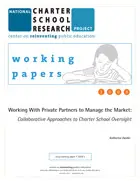Charter school growth has been steady but slow. Demand for new schools often outstrips the supply and new providers have uneven quality. To compensate, districts and authorizers may need to recruit new providers and/or offer technical services to bolster quality. Yet many, faced with limited resources and eager to preserve school autonomy, have resisted that role. This paper explores how third-party organizations in eight U.S. cities have filled the gap.
This paper finds that informal partnerships between authorizers and private organizations have the potential to improve the quality and quantity of new schools. By separating the “support” role from the “oversight” role, partnerships clarify lines of accountability and maximize administrative capacity. Informal partnerships also carry risks, however. Authorizers and charter organizations often have conflicting cultures or goals, and excessively close relationships may engender opposition from charter schools or the public at large.
For districts seeking to build the quality and quantity of schools in a clear and flexible manner, however, collaborative management is a key tool for the development and improvement of schools.




